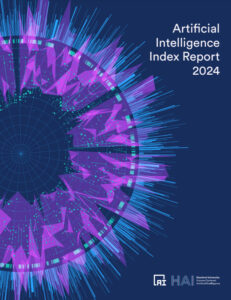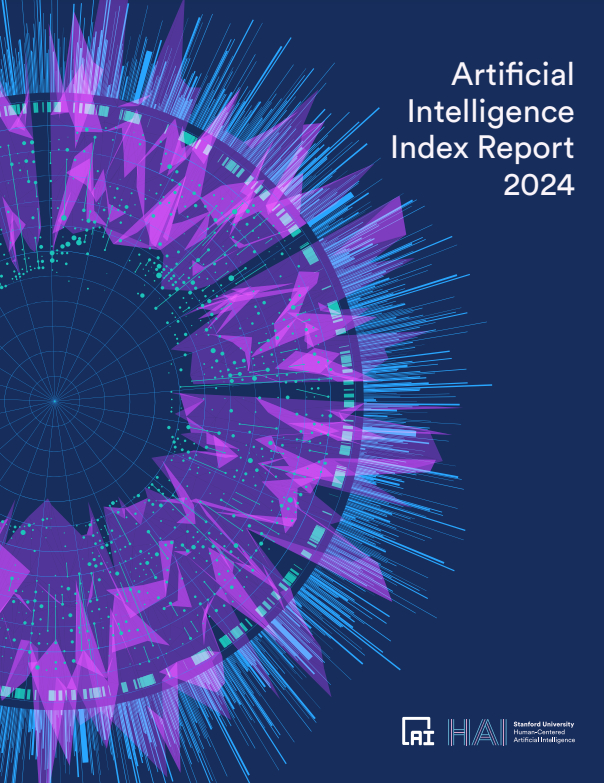The seventh issue of the Stanford University AI – Artificial Intelligence Index report has been published. It is definitely worth examining as it takes the pulse of the sector and the information in the report concerns us all to some extent.
Welcome to the seventh edition of the AI Index report. The 2024 Index is our most comprehensive to date and
arrives at an important moment when AI’s influence on society has never been more pronounced. This year,
we have broadened our scope to more extensively cover essential trends such as technical advancements
in AI, public perceptions of the technology, and the geopolitical dynamics surrounding its development.
Featuring more original data than ever before, this edition introduces new estimates on AI training costs,
detailed analyses of the responsible AI landscape, and an entirely new chapter dedicated to AI’s impact on
science and medicine.
The AI Index report tracks, collates, distills, and visualizes data related to artificial intelligence (AI). Our
mission is to provide unbiased, rigorously vetted, broadly sourced data in order for policymakers, researchers,
executives, journalists, and the general public to develop a more thorough and nuanced understanding of the
complex field of AI.
The AI Index is recognized globally as one of the most credible and authoritative sources for data and insights
on artificial intelligence. Previous editions have been cited in major newspapers, including the The New York
Times, Bloomberg, and The Guardian, have amassed hundreds of academic citations, and been referenced
by high-level policymakers in the United States, the United Kingdom, and the European Union, among
other places. This year’s edition surpasses all previous ones in size, scale, and scope, reflecting the growing
significance that AI is coming to hold in all of our lives.
Download – Stanford University – Artificial Intelligence Index Report 2024 – AI:
https://aiindex.stanford.edu/report/
NOTE: The PDF file is 502 pages. I summarized the most important topics with ChatGPT and added them below.
Artificial Intelligence Index Report 2024
Detailed Summary and Key Topics
1. Research and Development (R&D)
- Industry Dominance : In 2023, industry produced 51 significant AI models, while academia contributed 15. Industry-academia collaboration produced 21 models, a new record.
- The Rise of Open Source Models : In 2023, a total of 149 core models were released, of which 65.7% were open source.
- Training Costs : While GPT-4 cost around $78 million to train, this figure reached $191 million for Google’s Gemini Ultra model.
- Patent Growth : Since 2010, AI patents have increased 31-fold, with a 62.7% increase expected in 2022. China leads the pack, producing 61% of global AI patents.
- Publications and Open Source Research : AI publications have tripled since 2010, and AI projects on GitHub are projected to grow by 59.3% to reach 1.8 million in 2023.
2. Technical Performance
- Surpassing Human Performance : While AI has surpassed human performance in areas such as visual classification and language understanding, it has fallen behind in complex math and planning tasks
- Multimodal Models : Models such as GPT-4 and Gemini stood out with their ability to process both text and images.
- New Benchmarks : New challenging tests have been developed, including SWE-bench (coding), HEIM (rendering), and MoCa (moral reasoning).
- Robotics and Language Models : Language models have made robotic systems more flexible. Models such as PaLM-E and RT-2 have enabled robots to better interact with their environment
3. Responsible AI and Ethics
- Lack of Transparency : AI developers have been found to be inadequate in disclosing training data and methodologies
- Deepfake Issues : AI-based political deepfakes have become a significant threat affecting elections
- Vulnerability Detection : Hidden weaknesses of AI models are beginning to be discovered with more sophisticated methods
- AI Incidents : The number of AI-related incidents increased by 32.3% in 2023, reaching 123. Examples included the spread of fake content
4. Economy
- Productive AI Investments : Productive AI investments increase eightfold to reach $25.2 billion in 2023.
- US Investment Leadership : The US surpasses China and the European Union with $67.2 billion in AI investment.
- Workforce Efficiency : AI has enabled workers to complete their work faster and produce higher quality work. However, unsupervised use of AI can reduce performance.
- Robotics Dominance : China continues to lead in industrial robot installations, with its global share reaching 52.4%.
5. Science and Medicine
- Scientific Progress : AI has accelerated scientific progress in a variety of fields, from materials discovery to algorithmic sorting efficiency.
- Medical Systems : Models like AlphaMissence and EVEscape have revolutionized disease prediction and genetic mutation classification.
- FDA Approvals : AI-related medical device approvals reach 139 in 2022, representing a 12.1% increase.
6. Education
- CS Graduations : While the number of computer science undergraduate graduates is increasing in the US and Canada, the number of master’s and doctoral graduates is slowing.
- Transition to Industry : 70.7% of those who hold a PhD in AI choose to work in industry.
- Diversity in K-12 Education : Participation in high school computer science courses has increased among women and ethnic groups.
7. Policy and Management
- US and EU Leadership : AI-related legislation is rapidly growing in the US and EU. The EU’s AI Act of 2024 is notable.
- Global Legislation Surge : AI discussed in legislative processes in 49 countries by 2023.
8. Diversity
- Ethnic Diversity : While ethnic diversity is increasing in the US and Canada, gender gap is still a significant problem in Europe.
9. Public opinion
- Rising Concerns : 52% of the public feels more nervous about AI, while 66% believe AI will significantly impact their lives.
- ChatGPT Usage : In international surveys, 63% of respondents are familiar with ChatGPT and nearly half use it at least once a week.




